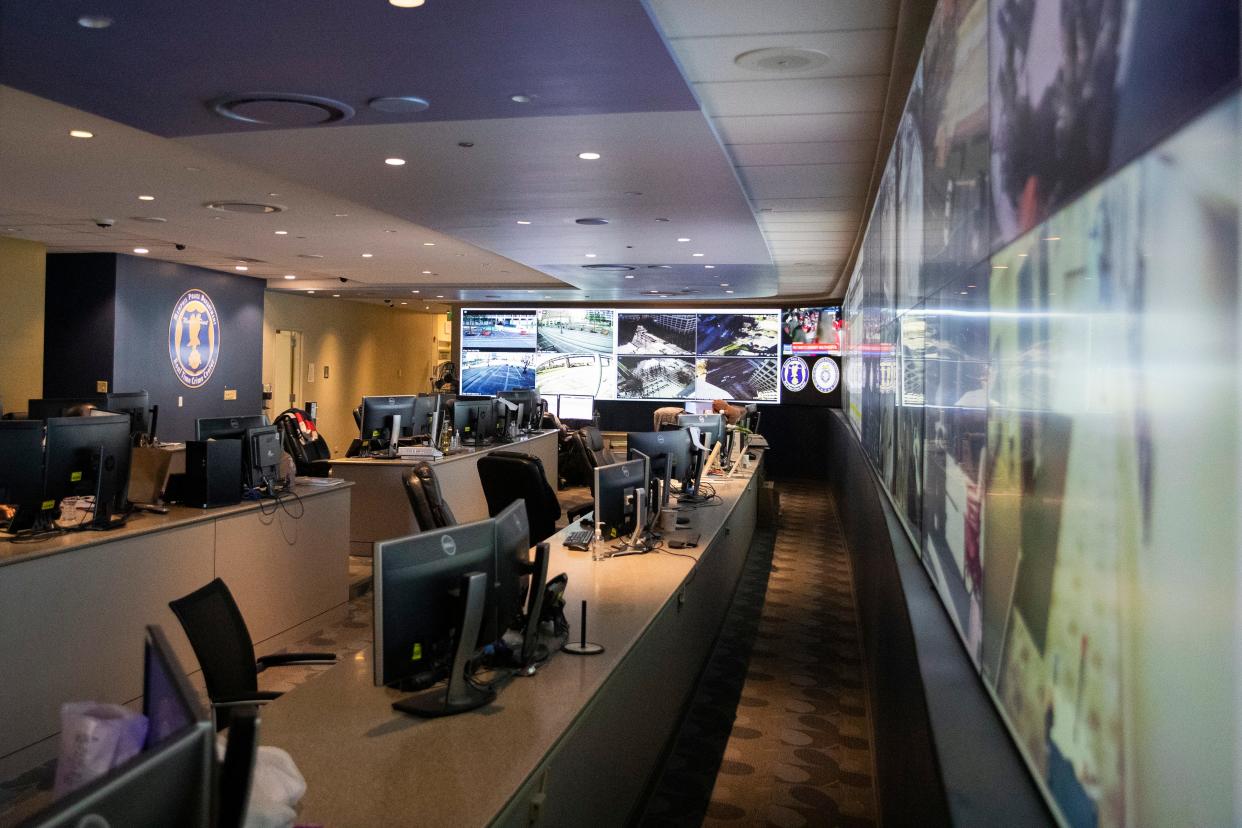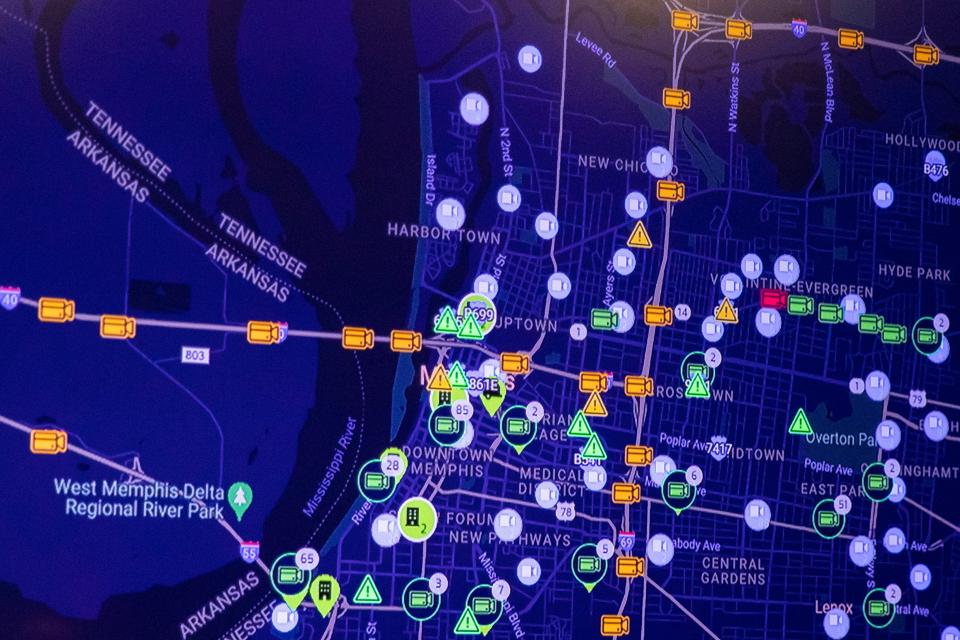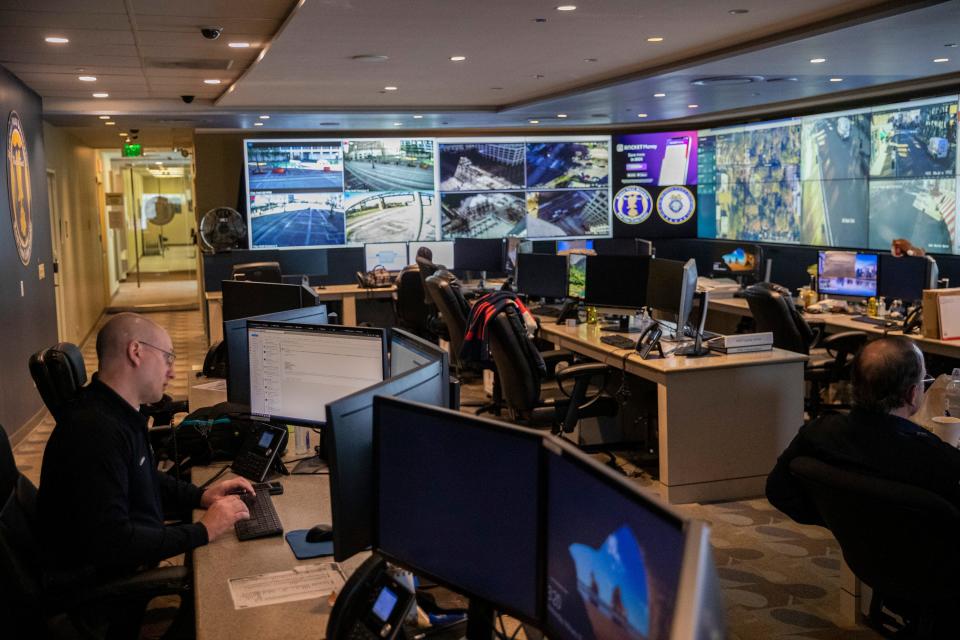A look at Memphis police's camera integration system, & why MPD says it helps fight crime

The Memphis Police Department's Real Time Crime Center was mostly silent Wednesday afternoon. Fewer than 10 people were sitting at desks on the floor, each person looking over information and typing at their three-monitor setups.
Each desk faced a wall filled with screens, each showing a different live feed from cameras around Memphis. Two televisions in the corners of the room were playing live news, with the volume just loud enough to be heard by staff.
Days earlier, on Feb. 11, the room had more life as staff coordinated with officers around the city to track down a man police say shot three people and stole a car from a woman who had her kids in the back seat.
"When we had [Courdarion] Craft running around killing and shooting people, we were up here watching the chase," Deputy Chief Joe Oakley, who oversees the department's information systems, said. "Then, when we got out on foot, we were watching cameras just to see what was happening. The command staff was here. We were doing a [Microsoft] Teams call with the chief and all the commanders on it. We were all engaged in it using this."

The "this" that Oakley referenced is a program that the department started about six months ago, but says is still in its infancy, called Connect Memphis. The program allows residents and businesses to register or integrate their cameras with MPD so investigators can quickly access information when a crime is reported.
The program also marries body camera, in-car camera, SkyCop camera and drone camera feeds when they are live with those residential and commercial cameras so investigators can locate cars or footage of a crime being committed.
Why is MPD asking residents to register with Connect Memphis?
Connect Memphis, sometimes referred to as Connect-2-Memphis, has two different programs residents can sign up for.
The first of those programs allows residents with any sort of camera — be it a full-on security camera or something as small as a Ring doorbell camera — to appear in the department's database. Oakley said MPD cannot access these cameras remotely, but they are able to see a map of registered cameras.
With registration, residents are asked to submit their name, address, email and phone number. When a crime is reported, investigators can find nearby homes and businesses that are registered and reach out to the camera owner. If there is footage of the crime, investigators will ask for that to be sent to them.

"This keeps the detective from having to go out there and knock on doors, take a thumb drive and try to locate video," Oakley said. "That's why we want people to register cameras. And, something else to think about, if I'm at home, do I want a police officer coming to my neighborhood? In some parts of the city, they don't want the police knocking on their door. If a suspect gets caught, they think the neighbor did it because they talked to the police. So this remains anonymous."
Registering a camera is free, Oakley said, but integrating a camera into the system will cost the resident or business money.
Integration requires a resident or business to have cameras that can be hardwired to a box receiver. These receivers allow the department to access a live feed of a camera from their computers, and rewind to view past footage.
Integration prices range from $350 to $7,300 for the first year, which Oakley said is due to having to buy the device. After the first year, the annual price to keep the service ranges from $150 to $2,300. Those prices range based on the device chosen, which each has its own storage and camera limits.
More: Memphis church hopes to reduce violence by turning guns into garden tools at gun surrender event
Oakley said many of the city's cameras and the Tennessee Department of Transportation's traffic cameras are already integrated into the system.
Some cameras also feature AI, which allows the department to search for cars or objects using keywords. He said it can be used to find things based on searching for bicycles, car descriptions and backpacks, for example, but said that they do not do facial recognition with the AI cameras.
Privacy concerns with camera integration
People choosing to integrate a camera have the ability to set time frames when a live feed of their cameras can be accessed, and residents are able to see when, and who, is accessing their camera feeds.
Oakley also said it is up to each person as to what camera is integrated into the system. Most of the cameras, he said, are external ones that look into front yards, parking lots and storefronts. But, should a resident or business owner want to integrate internal cameras, they are able to do so.
When speaking with The Commercial Appeal, Oakley flipped through various cameras around the city that had been integrated. The only internal cameras viewed by The CA were ones inside Buster's Liquor on Highland Street, a store that has been hit multiple times by smash-and-grab burglaries.

MPD Public Information Officer Theresa Carlson said interior cameras are unusual, and that the department wants to focus on exterior cameras.
"He wants us to have [access]," Oakley said. "Let's say we get a hold-up alarm, we're getting an alert on the cameras here. So we can pull these cameras up, we can get on the radio and say something like, 'We have a male, white, dressed in green camouflage, holding an AK-47. He's at the cash register right now.' And officers are gonna know."
Oakley said the integration can also help combat shoplifting.
The program also combines resources between agencies, Oakley said, with both MPD and the Shelby County Sheriff's Office having access to cameras on one another's systems.
More: A man was just convicted of a 1988 rape in Shelby County. How 'justice was done'
"[Registration and integration] is pretty widespread around the county," he said. "Believe it or not, we have some in Collierville, Piperton, Bartlett, they're all over the place, which is good because Shelby County has this, too. If you have something going on right here, by Fairway Glen, they could pull that up and contact someone. They can see if he has a camera, send them a little alert."
There are currently just over 6,000 cameras registered and 774 cameras integrated across the city, according to the Connect Memphis website, but Oakley said he would like to see more continue to join the program.
"On average, each detective spends eight hours a week of their work week canvassing for video," he said. "So, if we have this registry, and we have more cameras that are registered, the detective can get that video, hopefully, from his desk without ever leaving. It's a game changer in many ways, especially for time. It will keep them working these cases. When they're out collecting video, they can't investigate because they have to get video. Now they can get video from their desktop and then solve that case and go onto another one."
Lucas Finton is a criminal justice reporter with The Commercial Appeal. He can be reached at Lucas.Finton@commercialappeal.com, or (901)208-3922, and followed on X, formerly known as Twitter, @LucasFinton.
This article originally appeared on Memphis Commercial Appeal: Why Memphis police want to people to register cameras to fight crime

